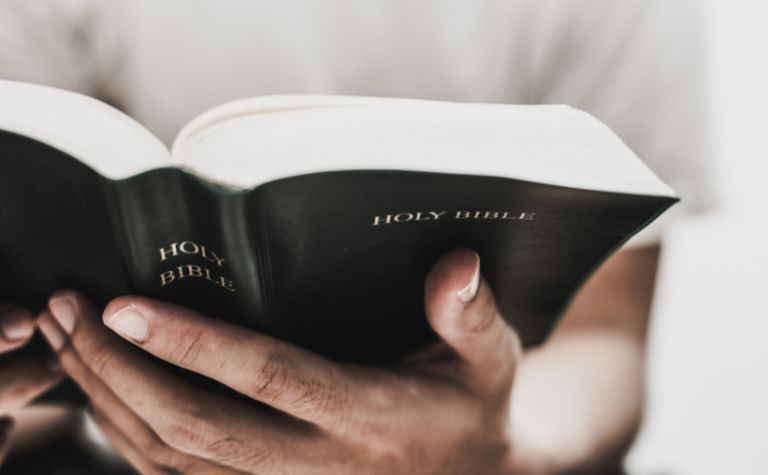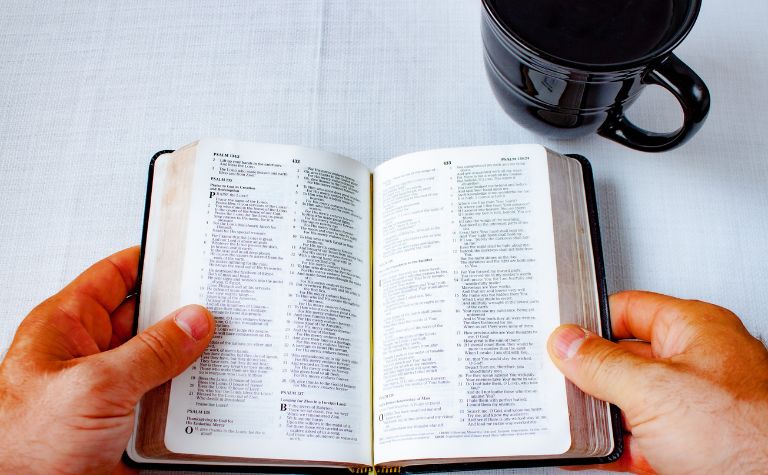The Bible mentions Asaph in several places in the Bible, but he’s not as well-known as figures like Abraham, Moses, or David. When all the references to “Asaph” are read and understood, it’s clear that there are four different men called that name in the Old Testament. However, one, a worship leader in ancient Israel, is referred to much more than the others.
The most prominent Asaph in the Bible, primarily mentioned in the book of Psalms, was from the Israelite tribe of Levi of the Gershonite clan. He served as a worship leader during the reigns of David and Solomon. Asaph sang and played instruments and is associated with 12 different Psalms.
How did Asaph lead praise and worship in Israel? What did David appoint him to do and why? What is an example of a song that Asaph sang? What Psalms are associated with Asaph and why? What themes do they have? What other Asaphs does the Bible mention? Keep reading to learn the answers to these questions and others.
Also, see Who Was Lot in the Bible? to learn more.

Asaph led Israelites in praise and worship
In ancient Israel, many people helped lead the community in praising God. Men from Levi had a unique role in worship because Israelite priests came from it. 1 Chronicles 16:4 reads, “Then [David] appointed some of the Levites as ministers before the ark of the Lord, to invoke, to thank, and to praise the Lord, the God of Israel” (ESV). Invoking, praising, and thanking God included singing and playing instruments.
Asaph was in charge of singers and musicians
David also designated one of the Levites the leader of the worship ensemble. Asaph was “chief” (1 Chron. 16:5a; ESV, NIV, NASB, KJV) and the singers and musicians. One translation calls him the worship “leader” (NLT). The Hebrew word translated chief or leader is roshe (רֹאשׁ) and means “head.” This description helps explain why Asaph is associated with several Psalms (see below).
Asaph also had authority over other leaders: “Second to him were Zechariah, Jeiel, Shemiramoth, Jehiel, Mattithiah, Eliab, Benaiah, Obed-edom, and Jeiel” (1 Chron. 16:5b). Asaph clanged the symbols, while other played instruments like harps, lyres, and trumpets. Asaph also sang: “Then on that day David first appointed that thanksgiving be sung to the Lord by Asaph and his brothers” (1 Chron. 16:7).
An example of Asaph’s singing
One of Asaph’s songs began, “Oh give thanks to the Lord; call upon his name; make known his deeds among the peoples! Sing to him, sing praises to him; tell of all his wondrous works!” (ESV). The song recalls God’s greatness and people’s gratitude. After the song, “all the people said, ‘Amen!’ and praised the Lord” (1 Chron. 16:36). To read the entire song, see 1 Chronicles 16:8-36.
As Israel’s worship leader, Asaph had responsibilities every day, yet tasks could vary each day. The commonality between all his work was helping Israelites understand and draw close to God. “So David left Asaph and his brothers there before the ark of the covenant of the Lord to minister regularly before the ark as each day required” (1 Chron. 16:37).
Also, see Who Was Aaron in the Bible? to learn more.

Asaph is associated with several Psalms
Psalms have superscriptions, which look like headings or titles, that inform readers about them, such as their author or the details about the historical background of their subject matter. Examples of superscriptions include “A Psalm of David” (e.g., Psa. 3), “A Psalm of Solomon” (e.g., Psa. 72), and “To the choirmaster” (e.g., Psa. 51).
12 out of the 150 Psalms have a superscription that associates them with Asaph.
- Psalm 50: “God Himself Is Judge”
- Psalm 73: “God Is My Strength and Portion Forever”
- Psalm 74: “Arise, O God, Defend Your Cause”
- Psalm 75: “God Will Judge with Equity”
- Psalm 76: “Who Can Stand Before You?”
- Psalm 77: “In the Day of Trouble I Seek the Lord”
- Psalm 78: “Tell the Coming Generation”
- Psalm 79: “How Long, O Lord?”
- Psalm 80: “Restore Us, O God”
- Psalm 81: “Oh, That My People Would Listen to Me”
- Psalm 82: ” Rescue the Weak and Needy”
- Psalm 83: “O God, Do Not Keep Silence”
All 12 Psalms above have a superscription that reads, “A Psalm of Asaph.” Psalm 50 is probably separated from the other 11 because it fits thematically with Psalms 48 and 49. [1] The titles listed above are from the ESV Study Bible and aren’t in the Hebrew text. They are supplied in this article to help readers recall the subject matter of the Psalms that are associated with Asaph.
Themes in Asaph’s Psalms
Themes found in the Psalms of Asaph include God as Judge (Psa. 50:3-4; 75:8; 76:8-9), a call to pure and holy spirituality (50:7, 14-15, 22-23; 81:8-10), and God as A Shepherd (74:1; 77:20; 79:13; 80:1). [2]
Also, see Who Was Cain in the Bible? to learn more.

Asaph’s school of music
Evidence suggests that part of Asaph’s legacy was establishing a school of music that continued after he died. When the book of Nehemiah mentions the Levites who returned to Israel after being in exile, it refers to 148 singers associated with Asaph, who had long been dead.
Nehemiah 7:43-45 reads, “The Levites: the sons of Jeshua, namely of Kadmiel of the sons of Hodevah, 74. The singers: the sons of Asaph, 148. The gatekeepers: the sons of Shallum, the sons of Ater, the sons of Talmon, the sons of Akkub, the sons of Hatita, the sons of Shobai, 138″ (emphasis added).
Other Asaphs mentioned in the Bible
- Asaph, the father of Hezekiah’s recorder: “And when they called for the king, there came out to them Eliakim the son of Hilkiah, who was over the household, and Shebnah the secretary, and Joah the son of Asaph, the recorder.” (2 Kings 18:18, ESV)
- Asaph, an official under Artaxerxes Longimanus, king of Persia: “And may I have a letter to Asaph, keeper of the royal park, so he will give me timber to make beams for the gates of the citadel…” (Neh. 2:8, NIV)
- Asaph, father of Meshelemiah: “As for the divisions of the gatekeepers: of the Korahites, Meshelemiah the son of Kore, of the sons of Asaph” (1 Chron. 26:1, ESV) [2]
Also, see Who Was Balaam in the Bible? to learn more.
References:
[1] Psalms by Willem VanGemeren. Expository Bible Commentary (Revised). p. 64.
[2] “Asaph” in The New International Bible Dictionary. p. 96-97.
Related Questions
Regular Bible reading is a valuable habit, as Scripture is God's message to people. However, the Bible's 66 distinct books, featuring various authors, settings, and themes, can make it challenging...
Catholic vs. Protestant vs. Orthodox: What's the Difference?
Roman Catholicism, Protestant Christianity, and the Eastern Orthodox Church are the three historical branches of the Christian religion. Each tradition traces its doctrines and practices to the New...
